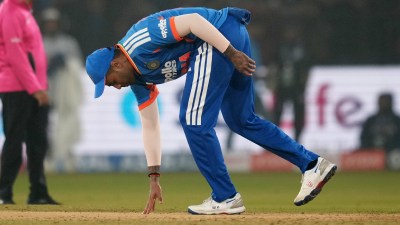Will regulate use of vulgar language on social media platforms and intermediaries: Centre to Delhi HC
The FIR alleged that in Episode 5 of Season 1 of College Romance "vulgar and obscene language" had been used. It alleged the episode showcased indecent representation or obscene portrayal of girls or women in the worst form.
 In April, the Delhi HC had asked the Centre to respond to the court’s March 6 decision, wherein the ministry was directed to take steps to enforce its rules on content containing obscene language with respect to intermediaries such as OTT platforms. (File Image)
In April, the Delhi HC had asked the Centre to respond to the court’s March 6 decision, wherein the ministry was directed to take steps to enforce its rules on content containing obscene language with respect to intermediaries such as OTT platforms. (File Image)
The Ministry of Electronics and Information Technology (MeitY) has informed the Delhi High Court it will incorporate rules and regulations to regulate social media platforms to make them safer from the use of vulgar language.
MeitY made the submission through a “compliance report” submitted before a single-judge bench of Justice Swarana Kanta Sharma in pursuance of the court’s directions in a previous ruling.
In its August 17 order, Justice Sharma noted the compliance report of the ministry saying it had taken note of the directions and observations made by the HC in the March 6 judgment as well as further orders.
The ministry said since it is a policy decision and after taking note of the HC’s concerns expressed in its directions, “the concerned Ministry, while undertaking its regular exercise of policy-making, will incorporate rules/regulations to regulate the social media platforms, intermediaries for making it safer from the use of vulgar language including profanity, bad words, etc., as per the judgment of this Court”.
While disposing of the plea Justice Sharma said, “Considering the same, this Court while taking note of the fact that it is a policy decision which is to be undertaken by the Ministry and the legislature, it is sufficient compliance of the order of this Court. This Court has been assured that the concerns of this Court expressed through the said judgment will be incorporated in the future rules and regulations which will be shortly undertaken”.
In April, the Delhi HC had asked the Centre to respond to the court’s March 6 decision, wherein the ministry was directed to take steps to enforce its rules on content containing obscene language with respect to intermediaries such as OTT platforms.
On March 6, the HC had passed judgment in a plea challenging orders directing for registration of an FIR against TVF Media Labs Pvt Ltd, the casting director of the web series College Romance, and its lead actors.
In its March 6 judgment, the High Court had said, “…this Court draws the attention of the Ministry of Information and Technology to the situations which are fast emerging on a daily basis and to take steps for enforcing the stricter application of its rules qua the intermediaries as notified in Information Technology (Intermediary Guidelines and Digital Media Ethics Code) Rules, 2021 and make any laws or rules as deemed appropriate in its wisdom, in light of the observations made in this judgment… A copy of this judgment be forwarded to the Secretary, Ministry of Electronics and Information Technology, Government of India, and concerned officials of YouTube India”.
The FIR alleged that in Episode 5 of Season 1 of College Romance “vulgar and obscene language” had been used. It alleged the episode showcased indecent representation or obscene portrayal of girls or women in the worst form.
The Additional Chief Metropolitan Magistrate had directed the registration of an FIR in September 2019, however, the Additional Sessions Judge in November 2020 modified the ACMM’s order directing that the FIR be registered under Section 67A of the IT Act only.
The Delhi High Court had upheld the sessions judge’s order to the extent that offences under sections 292 (sale, etc of obscene books, etc.) and 294 (obscene acts and songs) of the Indian Penal Code (IPC) are not made out and an offence under Section 67A (Punishment for publishing or transmitting of material containing sexually explicit act, etc, in electronic form) IT Act is made out
However, the court modified it to the extent of dropping the offence under Section 67 (punishment for publishing or transmitting obscene material in electronic form) of the IT Act.
“It is clarified that the direction to register FIR in the present case does not include a direction to arrest any of the accused/petitioner,” the HC had said upholding the order of the metropolitan magistrate for the registration of FIR under sections 67, 67A of the IT Act.
After watching a few episodes of the show, Justice Sharma had found the actors in the web series are not using “civil language” used in our country. “The Court not only found excessive use of ‘swear words’ being used, it rather found that the web series had a series of such words in one sentence with few Hindi sentences here and there. In the episode in question, there is a clear description and reference to a sexually explicit act,” observed Justice Sharma.
“The Court had to watch the episodes with the aid of earphones, in the chamber, as the profanity of language used was of the extent that it could not have been heard without shocking or alarming the people around…The Court notes that this is not the language that nation’s youth…use…” said Justice Sharma.
The HC had pulled up TVF Media, streamed on platforms such as SonyLiv, YouTube, and the petitioner’s platform TVF Play. It said “online content curator” and “intermediaries” are in clear violation of Information Technology (Intermediary Guidelines and Digital Media Ethics Code), Rules 2021, as neither was there any classification nor any warning regarding the profanity of language or excessive use of expletives.
“The web series was available to every age group. Therefore, this web series also stood covered under violation of the Rules of 2021,” the HC had said.
The court had also rejected the petitioners’ arguments that language or behaviour does not evoke lustful thoughts and opined that the use of “vulgar language” and “bad words in the public domain and social media platforms” open to children of tender age needs to be taken “seriously”.







